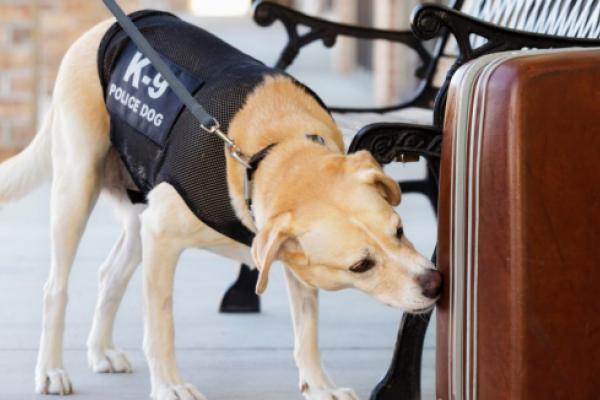Can drug-sniffing dogs smell your weed and hash? How accurate are they?
By Rudy Sanchez of The Fresh Toast, supplied exclusively to Benzinga Cannabis.
Certain factors, such as breed and environment, can significantly reduce the performance of dogs drafted to serve in the war on drugs.< /em>< /p>
In recounting the story of being arrested by police while dealing narcotics in 1994, Mr. Shawn Carter, better known as Jay-Z, describes a conversation where he tells the racial profiling officer that he is having his vehicle not consented to being searched. The officer then calls for drug detection medication, and now this dog becomes one of Mr. Carter's 99 problems. But a nosy dog discovering Hova's hidden drugs was far from certain. According to research on the effectiveness of drug-sniffing dogs, certain factors, such as breed and environment, can significantly reduce the performance of dogs enlisted in the war on drugs . A study carried out by Polish researchers from the Department of Animal Behavior of the Institute of Genetics and Breeding of the Polish Academy of Sciences, revealed that on average, dogs do not correctly found hidden drugs only 87.7% of the time, with false indications occurring about 5% of the time, and in 7% of cases the dogs were unable to find the hidden substances. Photo by Deonny Rantetandung via Unsplash The group found that German Shepherds were the best narc dogs, while Terriers, which are often used due to their small size, performed poorly. Dogs also performed better indoors than outdoors, while room familiarity had no significant impact. Finding drugs outside or inside a car was the most difficult task for man's best friend; these drug-sniffing dogs were only 58% accurate when searching in a car. Certain drugs can also leave residual odors that dogs cannot distinguish from the actual presence of substances, with cannabis buds and hashish leaving the strongest lingering odors, all dogs reported the presence of hash a day after being removed from the location, and 80% did so after 48 hours. Police dogs and their effectiveness are often seen as highly accurate and nearly infallible. K9s are also immune to racial and other prejudices, and agencies around the world rely on their keen sense of smell to find hidden narcotics. Even though Fido isn't perfect, study researchers point out that dogs are still the best tool for the job. © 2022 Benzinga.com. Benzinga does not provide investment advice. All rights reserved. Ad Disclosure: Rate information is obtained by Bankrate from listed institutions. Bankrate cannot guarantee the accuracy or availability of the rates shown above. Institutions may have different rates on their own websites than those displayed on Bankrate.com. The listings that appear on this page are from companies that this website receives compensation from, which may impact how, where and in which order products appear. This table does not include all companies or products available. All rates are subject to change without notice and may vary by location. These quotes are from banks, savings and credit unions, some of which have paid for a link to their own websites where you can find additional information. Those who have a paid link are our Advertisers. Those without a paid link are listings we obtain to enhance consumers' shopping experience and are not advertisers. To receive the Bankrate.com rate from an advertiser, please identify yourself as a Bankrate customer. Bank and savings deposits are insured by the Federal Deposit Insurance Corp. Credit union deposits are insured by the National Credit Union Administration.

By Rudy Sanchez of The Fresh Toast, supplied exclusively to Benzinga Cannabis.
Certain factors, such as breed and environment, can significantly reduce the performance of dogs drafted to serve in the war on drugs.< /em>< /p>
In recounting the story of being arrested by police while dealing narcotics in 1994, Mr. Shawn Carter, better known as Jay-Z, describes a conversation where he tells the racial profiling officer that he is having his vehicle not consented to being searched. The officer then calls for drug detection medication, and now this dog becomes one of Mr. Carter's 99 problems. But a nosy dog discovering Hova's hidden drugs was far from certain. According to research on the effectiveness of drug-sniffing dogs, certain factors, such as breed and environment, can significantly reduce the performance of dogs enlisted in the war on drugs . A study carried out by Polish researchers from the Department of Animal Behavior of the Institute of Genetics and Breeding of the Polish Academy of Sciences, revealed that on average, dogs do not correctly found hidden drugs only 87.7% of the time, with false indications occurring about 5% of the time, and in 7% of cases the dogs were unable to find the hidden substances. Photo by Deonny Rantetandung via Unsplash The group found that German Shepherds were the best narc dogs, while Terriers, which are often used due to their small size, performed poorly. Dogs also performed better indoors than outdoors, while room familiarity had no significant impact. Finding drugs outside or inside a car was the most difficult task for man's best friend; these drug-sniffing dogs were only 58% accurate when searching in a car. Certain drugs can also leave residual odors that dogs cannot distinguish from the actual presence of substances, with cannabis buds and hashish leaving the strongest lingering odors, all dogs reported the presence of hash a day after being removed from the location, and 80% did so after 48 hours. Police dogs and their effectiveness are often seen as highly accurate and nearly infallible. K9s are also immune to racial and other prejudices, and agencies around the world rely on their keen sense of smell to find hidden narcotics. Even though Fido isn't perfect, study researchers point out that dogs are still the best tool for the job. © 2022 Benzinga.com. Benzinga does not provide investment advice. All rights reserved. Ad Disclosure: Rate information is obtained by Bankrate from listed institutions. Bankrate cannot guarantee the accuracy or availability of the rates shown above. Institutions may have different rates on their own websites than those displayed on Bankrate.com. The listings that appear on this page are from companies that this website receives compensation from, which may impact how, where and in which order products appear. This table does not include all companies or products available. All rates are subject to change without notice and may vary by location. These quotes are from banks, savings and credit unions, some of which have paid for a link to their own websites where you can find additional information. Those who have a paid link are our Advertisers. Those without a paid link are listings we obtain to enhance consumers' shopping experience and are not advertisers. To receive the Bankrate.com rate from an advertiser, please identify yourself as a Bankrate customer. Bank and savings deposits are insured by the Federal Deposit Insurance Corp. Credit union deposits are insured by the National Credit Union Administration.
What's Your Reaction?















![Three of ID's top PR executives quit ad firm Powerhouse [EXCLUSIVE]](https://variety.com/wp-content/uploads/2023/02/ID-PR-Logo.jpg?#)







